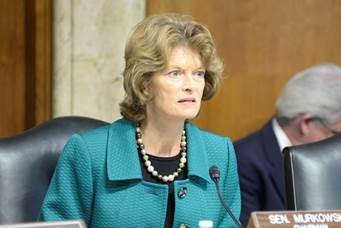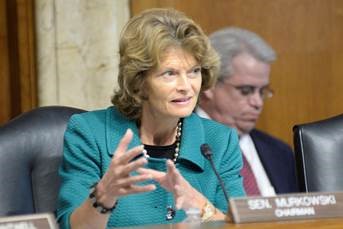Sen. Murkowski: Drought Conditions Devastating to Farmers, Local Communities and Economies
Leads Panel Examines Ways to Mitigate Drought Impacts
U.S. Sen. Lisa Murkowski, R-Alaska, today convened a hearing of the Senate Energy and Natural Resources Committee to examine drought conditions affecting the West, review creative ways states and local communities are working to address the issue, as well as examine potential solutions for the future.
“Today’s hearing made clear that while drought is a region-wide problem, there is a significant role Congress can play in addressing a number of the barriers – regulatory and otherwise – to improving water delivery and supplies for residents, farmers, and businesses in the West,” said Murkowski, chairman of the Senate Energy and Natural Resources Committee.
Click to view video
Drought conditions in the West are broad and impacting all western states to some degree. According to the most recent U.S. Drought Monitor report, roughly 57 percent of the West is now experiencing moderate to exceptional drought.
“Much of the West has been in varying degrees of drought for the past 15 years and the impacts are significant. In California and other parts of the west, farmers and others are feeling the pain of the drought – some communities no longer have running water and individuals in farming communities are losing jobs,” Murkowski said. “Moving forward, state and federal officials must continue working together to ensure the delivery of water where it is needed.”
Murkowski said the challenging weather conditions in the West are being aggravated, in part, by burdensome regulations that at times have put the needs of fish before those of residents.
“Many releases of water have been done to ensure protection of fish at the expense of cities, towns, and farmers,” Murkowski said. “In California water use is 10 percent urban, 41 percent agricultural, and a majority – 49 percent – is used for environmental management,” Murkowski said.
Click to view video
Murkowski stressed the need for collaboration between state, federal, and tribal governments to provide drought relief in the short term and a more permanent solution to reduce the threat of drought in the future.
“We hear that collaboration between state, federal, and tribal entities is vital to mitigating devastating drought impacts. But we are still in a situation where the pain of drought conditions is being exacerbated by a lack of flexibility in the regulatory process,” Murkowski said. “It’s clear to me that moving forward we need to address some of these bureaucratic roadblocks – whether it’s increasing water storage or dealing with excessive environmental requirements.”
Murkowski has long recognized the seriousness of drought conditions in California and across the West, and stands ready to help her colleagues in the Senate and the House on a legislative solution.










